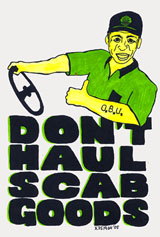High fuel costs least of truckers worries - Mandatory ID cards, new environmental regs putting them in a bind
Submitted on Mon, 11/19/2007 - 2:01pm
Disclaimer - The opinions of the author do not necessarily match those of the IWW. The image pictured to the right did not appear in the original article, we have added it here to provide a visual perspective. This article is reposted in accordance to Fair Use guidelines.
By Tatiana Prophet - Victorville Daily Press, November 14, 2007 - 8:16PM
 HESPERIA — Bobby Powell spent $650 to fill up his big rig the other day, while it normally costs him $450. That’s enough fuel for about a day and a half of driving.
HESPERIA — Bobby Powell spent $650 to fill up his big rig the other day, while it normally costs him $450. That’s enough fuel for about a day and a half of driving.
“I’m not making near the money I was,” said the truck driver as he passed through Hesperia on Wednesday afternoon.
Like many truck drivers, Powell owns his own truck and pays for his own fuel.
Fuel prices are just one of many concerns facing independent owner-operators at the close of this year.
Another is the new identification card required to pick up and drop off cargo at the ports of Long Beach and Los Angeles — the Transportation Workers Identification Credential — which officials plan to roll out as early as December.
Economist John Husing, a consultant to the ports, said the TWIC card might exclude between 15 and 22 percent of truck drivers — for either a criminal record or immigration violations, according to a survey recently conducted.
On top of that, the ports are considering new environmental regulations that would ban all trucks manufactured before 1989 at the ports, according to several sources.
The ports are in meetings to determine what kind of subsidy, if any, might be offered to truckers so they can buy new trucks.
“Nobody knows because the program’s not finalized,” Husing said. “There are major issues that have not been decided yet: Will the drivers be allowed to continue working as independent operators or will the drivers as part of the clean truck program be required to sell their trucks or become employees?”
Port truckers are some of the lowest paid in the industry, Husing said. Many truckers live throughout Southern California, including the High Desert.
And while the problems are many, the solutions are certainly not unified.
One union, the Industrial Workers of the World, is calling for a truckers shutdown on Monday from Dallas to Los Angeles to commemorate the death of Joe Hill, a union organizer who was hanged in Utah in 1915.
“There’s all these meetings going on behind closed doors, and everybody’s interests are being represented at these meetings, and there’s nobody there representing them except us,” said Jay Brophy, a representative of IWW.
The Teamsters Union supports making all drivers employees of the freight companies once again, Husing said, as they once were. Brophy, of the IWW, agrees.
“They have to pay for the fuel, they have to pay for the maintenance, the company doesn’t pay for their unemployment, worker’s comp, income tax, all of this is left on them.”
Stuart Hoynak, another trucker stopping off in Hesperia, does not mind being independent, nor does he mind being fingerprinted for a TWIC card.
“That I understand,” he said. “We got to be safe. They should document everybody. I feel it’s a security measure.”
What he does mind are the fuel costs.
“It’s hard for everybody,” he said. “I mean, it’s a major cut in pay. We don’t get paid for sitting unless the wheels are turning. And every fuel hike is hundreds of dollars out of our paycheck, not a couple of pennies. So right now with the price of fuel, we’re losing anywhere from 1,000 dollars-plus every week. ... When the fuel goes up sometimes an average of 5 cents every two days. There is no reason. There is no reason. It’s crazy. Everybody’s making a lot of money.”
Art Wong, spokesman for the Port of Long Beach, said he was not aware of a shutdown being planned.
But he acknowledged that big changes are ahead, both with the clean trucks initiative and the TWIC card.
“It will be a big change no matter what we do. Even if we leave it alone, everybody’s going to have to get new trucks, and even if we offer grants, I don’t know if these guys are going to be able to afford new trucks.”
About 40 percent of all goods entering the United States come through the ports of Los Angeles and Long Beach.
Any strike related to the ports can cost millions in lost time.
In 2002, a dispute between longshoremen and terminal operators resulted in the loss of about $1 million a day for the Los Angeles/Long Beach ports, according to trade magazine Land Line.